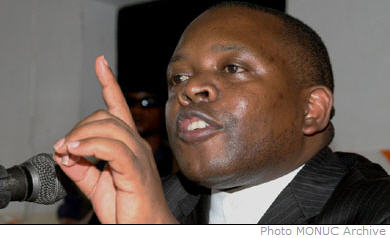 The Independent Electoral Commission (IEC) held an evaluation meeting with its NGO partners at its offices in Kinshasa on 12 December 2007, to assess the lessons learned from the 2006 elections, and to create a strategic framework for the holding of the DRC local, urban and municipal elections in 2008.
The Independent Electoral Commission (IEC) held an evaluation meeting with its NGO partners at its offices in Kinshasa on 12 December 2007, to assess the lessons learned from the 2006 elections, and to create a strategic framework for the holding of the DRC local, urban and municipal elections in 2008.
The meeting consisted of presentations, evaluations and an exchange of ideas on the successes and failings of the 2006 elections, with a particular focus on the civic and electoral education process.
IEC president Fr. Apollinaire Malu Malu explained that ‘the work consists in evaluating the activities of civic and electoral education in the DRC, and to create a strategic framework of action and roadmap for national civic and electoral education.”
“This work will start obviously at the level of each province and then we hope the results of the provinces will be consolidated at the national level. The work of evaluation is one aspect, strategic planning is another, and we hope that this strategic planning will be done in a participative way, so that everybody makes a contribution.”
Fr. Malu Malu further explained that there are many challenges to be overcome, including the lack of an electoral culture, illiteracy and the isolation of certain areas of the country.
“It is not the work that is lacking in the creation of civic and electoral education. It is the coordination of this work, the synergy of actions and activities which we have to focus on.”
Another area of evaluation is the active participation of women at all levels of the electoral process, especially the issue of elected women representatives.
“Hopefully we will be able to look at these figures and find a better strategy to increase the involvement of women at all levels of the elections, and not simply as electors, but in particular as electoral partner of the process,” Fr. Malu Malu said.
“Evaluation goes hand in hand with looking towards the future. In particular, it is necessary to be concrete and practical because the population needs concrete and practical actions, and this is very important,” Fr. Malu Malu concluded.
Related articles
- • Tshisekedi Says He Won, Can He Prove It? (December 17, 2011)
- • 19,497 Candidates to Run for 500 Seats in Parliament (September 26, 2011)
- • 31 Million Registered to Vote (July 20, 2011)
- • Parliament Approves Constitutional Amendments (January 16, 2011)
- • Parliament to Tackle Elections, 2011 Budget during September Session (September 14, 2010)
- • IEC: Elections to Cost $712 million (August 14, 2010)
- • Malu Malu Challenges Opponents of Elections Timetable (August 12, 2010)
- • Opposition, Civil Society Reject Elections Timetable (August 11, 2010)
- • Electoral Commission Sets Date for 2011 Presidential Election (August 9, 2010)
- • Kabila Signs Bill Creating New Electoral Commission (July 30, 2010)
- • Government, IEC Confirm 2011 Elections (April 27, 2010)
- • Voter Registration Extended for 15 Days in Kinshasa (August 4, 2009)
- • Voter registration preparations underway (May 5, 2009)
- • France contributes one million euros to support the electoral process in the DRC (August 28, 2008)
- • Launch of a Parity Observatory in the DRC (March 6, 2008)
- • UN SC authorizes MONUC to organize, conduct local elections (January 31, 2008)
- • William Swing leaves Congo with a note of hope (January 11, 2008)
- • Aid tops agenda as Kivus conference gets under way (January 9, 2008)
- • Security Council extends MONUC's mandate until 31 December 2008 (December 24, 2007)
- • One day plea by Congolese women for equal representation (December 7, 2007)
- • UNDP launches new electoral support project for the DRC (October 5, 2007)
- • Ebola outbreak "contained" - Kabila (September 14, 2007)
- • National Assembly closes second extraordinary session (July 19, 2007)
- • Congo: Consolidating the Peace (July 5, 2007)
- • National Assembly: The decentralisation law is the priority of priorities (June 5, 2007)
- • Deputy SG: 'All parties agree that there cannot be any alternative to dialogue and reconciliation' (April 24, 2007)
- • UN Deputy SG: 'President Kabila wishes to see the cooperation grow between the DRC and the UN' (April 23, 2007)
- • UN Deputy Secretary General to visit DRC (April 20, 2007)
- • Opposition militias join army in Equateur province (March 29, 2007)
- • UN mission steps up probe in wake of recent deadly violence (February 8, 2007)







